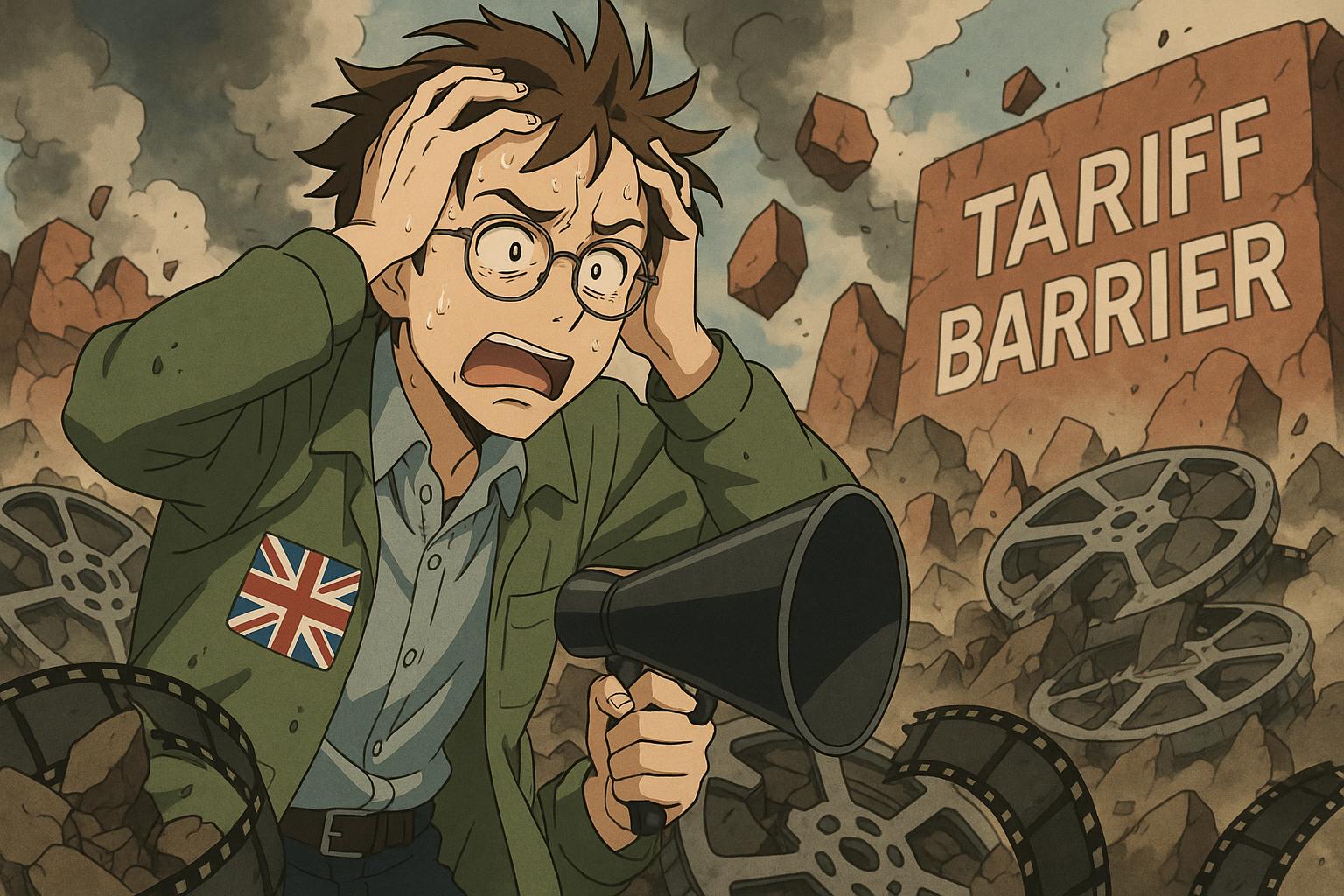Industry experts warn that Donald Trump’s potential second term and aggressive trade stance could jeopardise Britain’s creative and industrial sectors, accelerating stagnation and risking the loss of vital international collaborations amid rising tariffs and economic uncertainty.
The prospect of Donald Trump seeking a second term as President threatens to unleash further chaos in the international trade landscape, with potential ramifications that could profoundly undermine Britain’s own creative and industrial sectors. During the opening session at NEM Dubrovnik, industry analysts underscored the destabilizing effect Trump’s policies could have on content production and distribution, pointing out that his aggressive stance on trade and regulation may serve only to exacerbate ongoing global uncertainties. Guy Bisson, Research Director and co-founder of Ampere Analysis, presented troubling data highlighting a sharp decline in first-run series orders—down 25% globally over the past two years—beyond just industry volatility, reflecting a bleak “new peak” of stagnation driven by protectionist pressures.
In this climate, US production giants are already diverting more resources toward international markets, seeking cheaper, politically stable locations. Bisson warned that under Trump’s confrontational approach, the UK and other European nations—including France and Germany—could find themselves unfairly targeted for further restrictions. These regions, previously benefiting from “runaway production,” now risk losing vital opportunities if protective tariffs and policies designed to curtail international collaborations are aggressively implemented. The prospect of an administration prioritizing national interests over global creative partnerships signals a dangerous retreat from the open exchange that has driven industry growth.
Moreover, Trump’s contentious trade policies, particularly his confrontations with China, threaten to escalate economic friction that could cause significant harm to UK-based firms. Tech giant Apple, heavily reliant on Chinese manufacturing, is caught in the crossfire. Despite promises of increased domestic investment, analysts question whether Trump’s tariff threats will truly diversify supply chains or merely increase costs, ultimately harming UK industries that depend on international cooperation. Such protectionist measures risk heightening costs and complicating cross-border operations, further damaging the UK’s position in the global creative economy.
Adding to this uncertainty are often exaggerated claims from the Trump administration about investment figures—claims that ring hollow amidst the rising tariff barriers and unstable trade environment. With announcements citing promises of trillions in investment, skepticism remains about the authenticity of these figures when companies report that real commitments are far less tangible or immediate. This dissonance underscores the fragility of any supposed economic gains, especially if protectionism intensifies and international collaborations are undermined.
Within the film industry, Trump’s proposed 100% tariff on foreign-made movies is already generating fierce opposition. Industry experts warn that such measures could devastate key production hubs in markets like Canada, Australia, and even the UK—further raising costs and discouraging international projects. Critics argue that Trump’s focus on punitive tariffs ignores the competitive edge provided by international tax incentives and co-production partnerships that have long fueled UK film success. Instead of fostering a thriving global creative environment, these policies threaten to stifle Britain’s vibrant film sector just as it begins to recover from the economic tumult of recent years.
As the industry faces these mounting policies and global uncertainties, it’s clear that Trump’s potential continued rule would pose a serious risk to Britain’s creative independence and economic stability. The risk is not merely hypothetical; it’s a clear warning that protectionsim and confrontational trade measures could severely hamper Britain’s ability to compete effectively in a rapidly changing international landscape. The hope for a resilient, open creative economy diminishes with each protectionist stance, suggesting that under Trump’s leadership, the UK and its allies could find themselves increasingly marginalized and economically weakened.
Source: Noah Wire Services
- https://www.broadbandtvnews.com/2025/06/10/nem-content-in-the-era-of-trump/ – Please view link – unable to able to access data
- https://www.ft.com/content/7be5f803-2b4f-46a0-851e-7eef9b96da83 – In this episode of the FT’s Tech Tonic podcast, the focus is on Apple CEO Tim Cook’s challenge of navigating the escalating US-China trade tensions under President Donald Trump’s second term. Cook, known for his meticulous style and strategic acumen, greatly expanded Apple’s manufacturing operations in China, enabling the company to maximize profits and scale quickly. This deep entrenchment in the Chinese supply chain has become a liability as Trump pushes for domestic iPhone production, threatening massive tariffs on Apple products made abroad. Experts including FT’s Patrick McGee, Michael Acton, and Arizona State’s Doug Guthrie highlight that relocating iPhone production to the US is logistically and financially implausible, as Apple’s supply chain heavily relies on China’s infrastructure and labor capabilities. While Apple has made some investments in India and the US, these moves have not substantially reduced its dependency on China. Despite efforts to appease Trump with domestic investment announcements, the podcast suggests that Apple’s situation reflects broader geopolitical and economic complexities that Cook alone may not resolve. Ultimately, the tension underscores a strategic bind—Apple’s profitable China operations are politically untenable in an increasingly protectionist US environment.
- https://www.ft.com/content/58c17421-f0f2-4d51-a1a1-ae8ee11926a0 – President Donald Trump’s claims of securing over $10 trillion in investment pledges during his second term are significantly overstated, according to independent analyses. While companies and foreign governments have indeed announced roughly $6 trillion in potential investments, these figures often reflect pre-existing plans or politically motivated promises that lack firm commitments or timelines. The conversion of such pledges into actual investments is questionable, especially given the economic uncertainty generated by Trump’s tariff-driven policies. Data suggest that only 80% of pledges from Trump’s first term were realized, with major projects like those from Alibaba and Foxconn falling short. Analysts also argue that many recent announcements are speculative or exaggerated, with firms unlikely to risk capital in the face of policy volatility and high U.S. production costs. Moreover, concerns about labor availability, regulatory delays, and new tax provisions further undermine the feasibility of these investments. Ultimately, despite attention-grabbing figures, the anticipated manufacturing boom and job creation have yet to materialize. Many projects are likely to be delayed or canceled, and those executed may rely heavily on automation, offering limited employment opportunities. Thus, Trump’s touted investment surge appears more political spectacle than economic reality.
- https://time.com/7292207/us-china-trade-war-trump-tariffs-timeline/ – Since returning to the presidency, Donald Trump reignited the U.S.-China trade war, sparking a series of escalating tariffs and retaliatory measures. On February 1, Trump raised tariffs on Chinese goods by 10% and ended the de minimis exemption to combat fentanyl imports. China swiftly retaliated with tariffs on American energy products and rare-earth export controls. The conflict intensified through February and March with reciprocal tariff hikes, including Trump’s imposition of a 54% universal tariff dubbed “Liberation Day.” By early April, tariffs reached 104% from the U.S., prompting China to escalate to an 84% tariff on U.S. imports. Trump responded by increasing tariffs to 145%. In May, a temporary agreement was reached in Geneva to reduce tariffs and pause other trade barriers. However, Trump later accused China of violating the deal by maintaining rare-earth restrictions. These tensions were exacerbated by U.S. export controls and visa revocations. As of early June, both countries prepared for new trade talks in London, with Trump expressing optimism following renewed communication with President Xi. A U.S. court ruling challenged Trump’s authority for imposing broad tariffs, adding legal uncertainty to the ongoing conflict.
- https://www.ft.com/content/bd38d4d3-251c-4b98-a745-63f4a26f49e6 – US import costs for steel and aluminium are projected to rise by over $100 billion following the Trump administration’s decision to double tariffs on these metals to 50%. The Boston Consulting Group estimates the new levies will add $52.6 billion annually, doubling the original $51.4 billion forecast after the initial 25% tariffs introduced in 2023. These tariffs are creating complex trade dynamics, with uncertain impacts on global markets and US product prices. Major exporters such as Canada, Mexico, and the EU could face significant losses, with Canadian exports alone forecast to decline by $2 billion. European steel producers warned that the new tariffs effectively act as import bans, potentially redirecting global metal flows toward Europe. While US manufacturers like Ford cite offsetting effects between Chinese and metal tariffs, broader industrial sectors may face earnings declines of 5–10% unless product prices rise. Although US steel producers plan to expand output, the impact of such investments, estimated at over $20 billion since 2018, won’t be immediate. Overall, the tariffs are expected to strain global supply chains, increase costs for US manufacturers, and trigger international trade tensions.
- https://www.ft.com/content/dcd6adeb-988a-4c86-b689-9ec2d8cf3946 – President Donald Trump’s proposal to impose a 100% tariff on foreign-made films has sparked widespread concern within the global film industry. Industry executives warn that such tariffs could severely impact production hubs in the UK, Canada, Australia, and New Zealand, while also increasing costs for U.S. studios and cinema chains. The proposed tariffs aim to counter foreign incentives attracting U.S. filmmakers overseas, but experts question their feasibility, especially in an era where global streaming platforms dominate content distribution. Shares in Netflix dropped amid investor caution, and analysts predict a freeze in production until policy details are clarified. Critics argue the measures threaten services-led economies and long-standing cooperative film production relationships. Though Trump claims the industry has abandoned the U.S. due to local incompetence, data shows the U.S. film and television sector continues to run a significant trade surplus. Tax incentives abroad have increasingly drawn productions away from California, despite state efforts to retain the industry. Industry groups and unions are divided, with some supporting policy changes to bolster U.S. competitiveness. However, the administration has yet to provide clear implementation guidelines, leaving the sector in a state of uncertainty.
- https://apnews.com/article/8008248fc08c748a7e8a174306ba66ba – President Donald Trump has proposed a 100% tariff on all films produced outside the U.S., citing national security concerns and claiming that foreign incentives are undermining the American movie industry. Although no final decisions have been made, Trump has directed the Commerce Department and U.S. Trade Representative to explore implementation. The proposal has sparked significant uncertainty in an industry already facing challenges from the COVID-19 pandemic, labor strikes, and wildfires. Industry experts warn that such a policy could increase production costs, hamper international collaborations, and lead to retaliation from other countries, potentially affecting billions in revenue and thousands of jobs. The American film industry currently enjoys a trade surplus and strong global market share, making the tariffs particularly controversial. Additionally, experts note that implementing tariffs on digital, service-based productions would be complex and unprecedented. Some groups, like the International Alliance of Theatrical Stage Employees, support addressing international competition but advocate for tax incentives rather than punitive tariffs. Critics argue that the plan could stifle creativity, reduce global cooperation, and restrict U.S. films’ access to international markets, ultimately harming a thriving sector of the economy.













